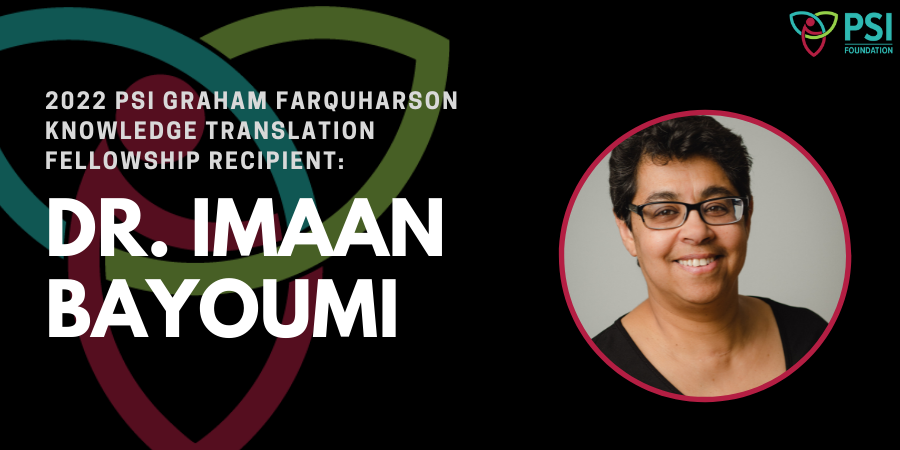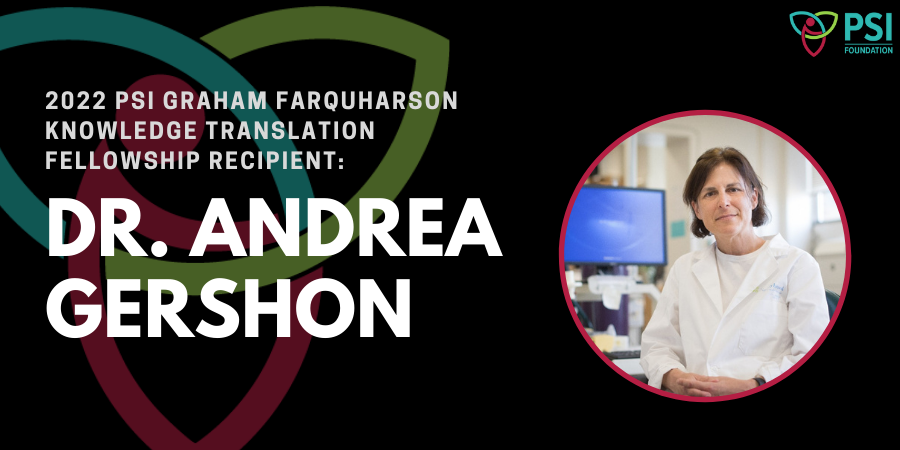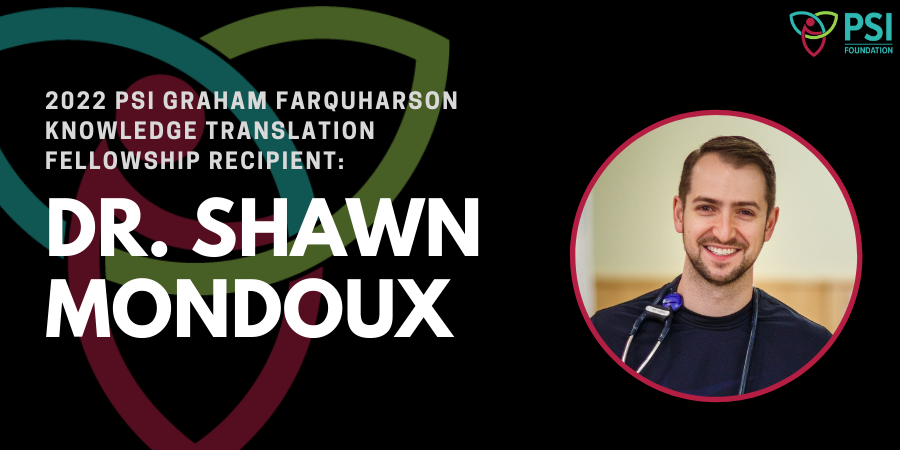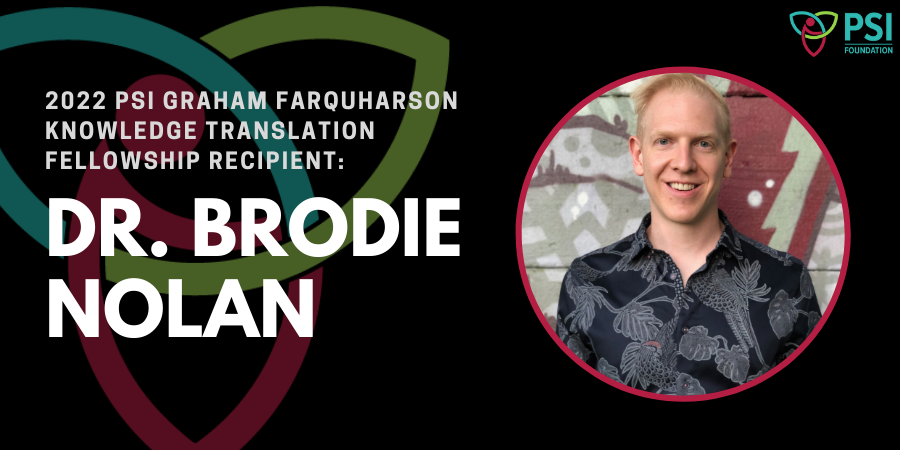“Being awarded the PSI Fellowship will allow me to spend more time to build my research program on improving the quality of healthcare for the millions of Canadians with peripheral artery disease. As a new investigator, it would jump start my career by giving me the time to focus on completing some early, high-impact, and potentially practice-changing work related to this goal. It would therefore catalyze my transition from being a trained surgeon and researcher into an independent surgeon-scientist who hopes to help transform peripheral artery disease care in Canada and internationally.
Approximately 10% of Canadians have peripheral artery disease (hardening, narrowing, and occlusion of the leg arteries). People with peripheral artery disease have a high risk of lower limb amputation, heart attack, stroke, and death. Clinical practice guidelines strongly recommend providing certain blood thinner, cholesterol reducing, and blood pressure lowering medications to people with peripheral artery disease because these medications reduce the risk of these adverse outcomes. However, international studies have reported that these medications are often markedly underprescribed to people with peripheral artery disease.
As the 2022 PSI Graham Farquharson KT Fellow, I aim to conduct a multi-phased, mixed-methods study to: 1) understand gaps in the prescription of and adherence to guideline-recommended cardiovascular medications among Ontarians with peripheral artery disease; 2) identify factors that may influence the prescription of guideline-recommended medications to Ontarians with peripheral artery disease; and 3) develop a tailored and evidence-informed implementation intervention to improve medication prescription by doctors and nurses. Ultimately, this implementation intervention could then be used as a template for other provinces and countries interested in performing similar interventions. My research team and I believe these types of interventions will significantly improve the health outcomes of people with peripheral artery disease and reduce their overall health resource use.” – Dr. Derek Roberts
Dr. Derek Roberts Awarded: 2022 PSI Graham Farquharson Knowledge Translation Fellowship
PSI Foundation is delighted to announce Dr. Derek Roberts of University of Ottawa as the 2022 PSI Graham Farquharson Knowledge Translation Fellow.
About Dr. Derek Roberts
Dr. Derek Roberts is a vascular and endovascular surgeon and new investigator based in the Division of Vascular and Endovascular Surgery at The Ottawa Hospital and University of Ottawa. He completed a pharmacy degree (and practiced as a pharmacist) and an MD with Distinction at Dalhousie University; a residency in general surgery, the Clinician-Investigator and Surgeon-Scientist Programs, and a PhD in epidemiology with a focus on KT at the University of Calgary; the KT Canada Strategic Training in Health Research (STIHR) fellowship; and a fellowship in vascular and endovascular surgery at the University of Ottawa. The KT Canada STIHR Fellowship provided Dr. Roberts with rigorous graduate training in the science and practice of KT and made him one of the first surgeons or surgical trainees to complete formal training in KT in Canada. This training included completion of a KT-related PhD thesis and attendance or completion of monthly KT Canada seminars, twice-monthly research operations seminars, the annual KT Canada Summer Institute (two consecutive summers), and KT-related graduate courses.
Dr. Roberts was appointed as an Assistant Professor in the Department of Surgery on January 1st, 2021. He was then cross-appointed to the School of Epidemiology and Public Health at the University of Ottawa on September 1st, 2021 where he is approved to supervise MSc students and co-supervise PhD students. He currently spends 30% of his time conducting research (during which he has no clinical responsibilities) and 70% practicing vascular and endovascular surgery and providing direct patient care to patients with peripheral artery disease and other vascular surgical problems.
About Dr. Derek Roberts’ Research Program
The overarching objective of Dr. Roberts’ research program is to improve the quality of healthcare and outcomes for people with peripheral artery disease and several other vascular surgery problems. He began his career by using his research training to attempt to improve the perioperative outcomes of people with peripheral artery disease who require lower limb revascularization surgery. These surgeries are commonly-performed, high-risk, and costly procedures performed to improve quality of life and prevent leg amputation in people with peripheral artery disease. Dr. Roberts recently studied 20,988 patients who underwent lower limb revascularization surgery in Ontario. Study results were published in the prestigious British Medical Journal (BMJ). Use of neuraxial instead of general anesthesia was associated with decreased mortality, health care costs, and length of hospital stay. He is now using an integrated KT approach to involve stakeholders across Canada in the design of a multicenter pilot and then Canada-wide randomized controlled trial to test whether use of neuraxial instead of general anesthesia may improve the outcomes of PAD patients undergoing lower limb revascularization surgery.
Dr. Roberts now seeks to use his training in pharmacy, epidemiology, vascular and endovascular surgery, and KT to understand and subsequently reduce gaps in the use of guideline-recommended medications for people with peripheral artery disease. He will be conducting these studies alongside colleagues in the Division of Vascular and Endovascular Surgery at the University of Ottawa, members of the Canadian Society for Vascular Surgery, and world experts in KT at the University of Ottawa, including members of the Centre for Implementation Research ( http://www.ohri.ca/cir/) at the Ottawa Hospital Research Institute.
About the PSI Graham Farquharson Knowledge Translation Fellowship
Knowledge translation research aims at transitioning research discoveries to the real world to improve health outcomes. This prestigious fellowship – valued at $300,000 for over three years – helps protect a promising clinician’s research time, allowing the Fellow to undertake high-impact translational research.





